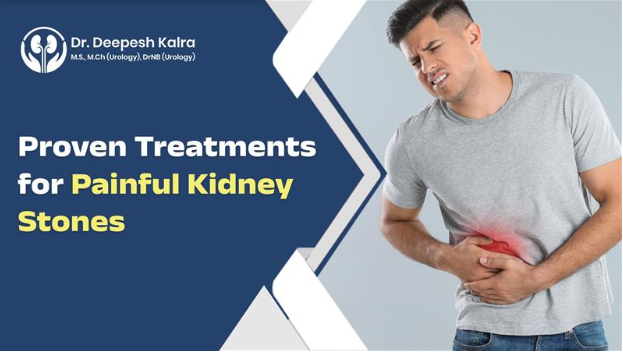Ever heard the “kidney stone pain is worse than labor pain” spiel? Well, that’s how it can seem! If you’ve had it, you’ll remember the sharp, stabbing pain that appears to spread throughout your body. The good part? Today, there are many treatments for the problem, from simple medicines to aggressive surgery. And whether you want to get expert care, you can go for options like Kidney Stone Treatment in Jaipur, to get rid of the same.
What Exactly Are Kidney Stones?
Picture little crystals developing inside your kidneys, sticking to one another and becoming hard little “pebbles.” That’s what kidney stones are. They are composed of minerals and salts that your body cannot successfully eliminate.
Some are so tiny that they faint without you even knowing. Others, though? They become trapped, clog the flow of urine, and cause pain so intense that you drop whatever you’re doing.
Common Symptoms You Shouldn’t Ignore
Kidney stones know how to make their presence known. Here are a few of the clues:
Acute and severe, sudden onset of pain in your back or sides
The burn of painful urination (you’ll be peeing fire)
Blood in your urine (not dangerous but unusual)
Need to urinate, but little urine
Nausea or vomiting
If these symptoms are known, you can cope with kidney stones.
How Can Doctors Diagnose Kidney Stones?
This isn’t just a guessing game, you’ll need good tests to know for sure.
Imaging tests: Depending on the location and size, CT scans or ultrasounds do their part to point it out.
Urine and blood tests: They can help determine what kind of stone you have and why it is.
Medical history: Doctors also ask about your lifestyle, diet, and family history.
Conservative Care: The First Line of Treatment
Not every kidney stone needs an operation. Small stones may come out with the help of hot water and Epsom salt, or lemon juice.
Drink More Water
Water is your best friend. Keeping fully hydrated can help to flush stones out before they get bigger.
Pain Relievers
Passing a stone can be so painful that many percent of people who have had one say it was the worst pain they have ever experienced, even worse than childbirth and broken bones, said Dr. Ira Kurtz, an emergency medicine specialist at UCLA Medical Center. Painkillers either over-the-counter (OTC) or prescribed can help soothe the agony.
Medications to Relax the Tract
Medications may be helpful in other cases, in part by relaxing the muscles of the urinary tract to help stones pass more readily.
Diet Tweaks
Preventing stones in the first place means trying not to get too much salt, sugar or oxalate-rich foods, such as spinach.
Minimally Invasive Treatments: High-Tech Relief
If it doesn’t budge, doctors escalate to more sophisticated but still relatively noninvasive strategies.
Shock Wave Therapy (ESWL)
Sound waves that break rocks? That’s basically what this does. Shock waves break the stone into tiny pieces, which are then able to pass easily.
Ureteroscopy
Here, a narrow scope is passed up through your urinary tract. The doctor removes the stone or breaks it into small pieces. No cuts, no stitches.
Surgical Solutions: When Things Get Real
Sometimes stones are too stubborn or too large for other techniques. That’s when surgery steps in.
Percutaneous Nephrolithotomy (PCNL)
For large stones, doctors cut a small incision in your back and remove the stones directly. It sounds scary, but it is very effective.
Traditional Surgery (Rare)
Open surgery is rarely done these days, but remains an option for the most complex of cases.
Post-Recovery And How You Can Contribute To Prevention
The plot doesn’t wrap up when the stone disappears. They need new ones, not to form.
Stay hydrated always
Stick to the diet prescribed by your doctor
Be active (exercise supports the health of your whole kidney function)
If symptoms come back, don’t ignore them
Natural Remedies: Do They Help?
Many people swear by home remedies. Although they may be useful, they should never replace a medical consultation.
Lemon water: Citric acid discourages stones.
Herbal teas: Some could be helpful, and always consult with your doctor first.
Balanced food regimen: Fresh end result, veggies, and whole grains support kidney health.
When to See a Specialist
If you can’t stand the pain, if you see blood in your urine, or if you’re getting stones over and over, don’t tough it out. That’s when a consultation with a kidney specialist is in order. They’ll help push you toward the treatment that is safest and has the greatest chance of improving your symptoms.
Conclusion
Kidney stones might seem tiny mischief-makers, causing enormous pain, but there’s good news for sufferers they are treatable. From basic medicines and hydration to complex surgeries, there’s always a fix. What counts is quick action and expertise. And, if in doubt, the safest step towards permanent relief and healthier kidneys is consulting the Best Urologist in Jaipur.
Yes! Recommendations: Small stones smaller than 5 mm can often pass on their own with large amounts of water(Someone, either patient or a fellow, will correct me if I’m wrong on this one).
No, several which can be treated with medications or shockwave therapy.
Too much salt, too much sugar, too much in the way of processed food, and too much of things that happen to be rich in oxalates, like nuts and spinach.
